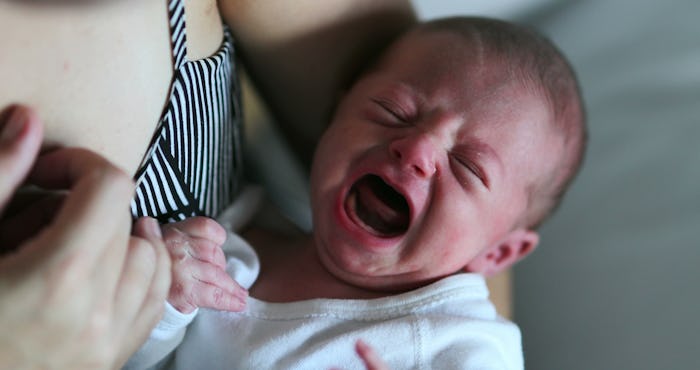Life

Can Babies Get Kidney Infections? Here's What You Need To Know
Sometimes your baby isn't feeling well, but it's difficult to pinpoint exactly what's wrong. In some cases, the baby is dealing with a potentially serious infection, but they are unable to describe the symptoms. For instance, do babies get kidney infections? It seems like a rough sickness for somebody so young.
"Yes, babies can get kidney infections. The medical term for this is pyelonephritis, as compared to just a bladder infection, known as cystitis," as Marva Moxey-Mims, M.D., Division Chief of Nephrology at Children's National in Washington, D.C., tells Romper. The two conditions are often lumped together and simply referred to as a urinary tract infection, or UTI. A severe type of UTI, kidney infections can result in kidney damage or a rare, life-threatening infection in the bloodstream known as sepsis, according to the Mayo Clinic.
In general, UTIs are fairly common in infants. "UTIs occur in about 3 percent of children younger than age 2 who have a fever," says Dr. Moxey-Mims. Because babies are in diapers most of the time, they're especially vulnerable to getting UTIs, which thrive in these warm and moist environments, as Darshak Sanghavi, M.D. explained in Parents. (It's gross but true.) Because of their shorter urethra, females are more likely than males to get UTIs, says Dr. Moxey-Mims.
The signs of a kidney infection in babies can be varied and nonspecific. "Symptoms include fever, vomiting, diarrhea, crying during urination, abdominal pain, and cloudy or foul-smelling urine," Dr. Moxey-Mims explains. In some cases, a fever may be the only sign of a kidney infection in infants, according to the Merck Manual. "Infants younger than 2 months old who have a fever, especially without an obvious source, should be checked for UTI," says Dr. Moxey-Mims. With this in mind, it's extra-important to see your pediatrician for a urine test if you even suspect your kid is sick with this type of infection.
As far as treatment for a kidney infection is concerned, it's important to give your child all medication as prescribed, according to Healthwise. Don't stop the course of antibiotics ahead of time, even if your kid appears to be feeling better. For most people, staying well hydrated is another crucial part of the treatment plan, so talk about hydration options with your pediatrician. As always, if your baby does not appear to improve after a few days of treatment, contact your pediatrician about a follow-up visit. For the most part, however, early diagnosis and treatment of the infection will take care of it in no time.
Preventing future kidney infections is the final part of the treatment plan, because no one wants their kid to go through this ordeal all the time. "In infants and toddlers, frequent diaper changes can help prevent the spread of bacteria that cause UTIs," says Dr. Moxey-Mims. "Wipe from front to back when cleaning the diaper area so that you don’t spread bacteria from the rectum to the urethra." Speak with your pediatrician to get more personalized prevention tips for your own kid. That said, there's no reason to feel guilty if your child gets UTIs from time to time. Some children are simply more likely to get them than others. "Sometimes, despite normal parenting, UTIs happen. What is probably the most important thing is to see your doctor to figure it out, [and] get treated," as Dr. Rob Darzynkiewicz, Chief Medical Officer of Hazel Health, tells Romper.
No parent wants to see their kid hurt, and of course you want to be aware of the signs that your baby is not feeling well. So if your infant shows any signs of a UTI or kidney infection, then schedule that trip to the pediatrician pronto.
This article was originally published on